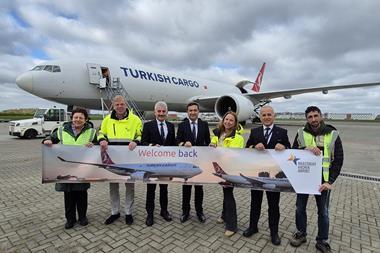Copenhagen Airport (CPH) has revealed that continuous 'preighter' operations have helped it to establish itself as an "airfreight gateway to Scandanavia" after the bulk of it cargo capacity — bellyhold — was cut at the onset of the pandemic.
"Looking back to February this year, the majority of airfreight in and out CPH was transported in the belly of passenger aircraft," the hub said. "By the middle of March, most routes [serving the hub] were on a temporary break, and in a matter of a few weeks the widebody cargo capacity to and from Copenhagen dropped to almost nothing."
Carriers operating at CPH include SAS, Qatar Airways, Singapore Airlines, Thai Airways, Air China and Air Canada.
CPH said that over the summer, air cargo capacity has "steadily increased" due to airlines resuming passenger services, as well as maintaining their preighter operations.
By the end of September this year, CPH had processed almost 70% of the cargo volumes in the same period of 2019 at just above 50% of the capacity.
The hub said it saw an increase in pharmaceuticals handled at the hub, as well as fresh salmon and PPE.
In addition, CPH said there has been significant growth in the e-commerce sector during the pandemic, with "increasing tonnages for airlines such as DHL Aviation, FedEx Express and UPS — a trend which has been clearly seen in CPH".
CPH air cargo manager Lars Gotfredsen, commented: "From the beginning of Covid-19, several Asian, Middle Eastern and North American airlines have shown strong commitment to CPH by offering several weekly frequencies carrying cargo only. Our entire region and industry heavily rely on these prime carriers to transport much needed products such as PPE, pharmaceuticals, foods and machinery parts."
He continued: “In close cooperation with the airlines, we have managed to uphold some of the most important trade lanes to and from Denmark, and we thank our airline partners for choosing CPH as their main air freight gateway to Scandinavia."
Looking forawrd, CPH said its cargo team remains "optimistic in these difficult times".
"Whilst we may not see the same 345,000 tonnes of cargo volume that we had in 2019 this year, we continue to work with our partners to keep developing this vital part of the Airport and Denmark’s infrastructural links and capacity," the company said.










